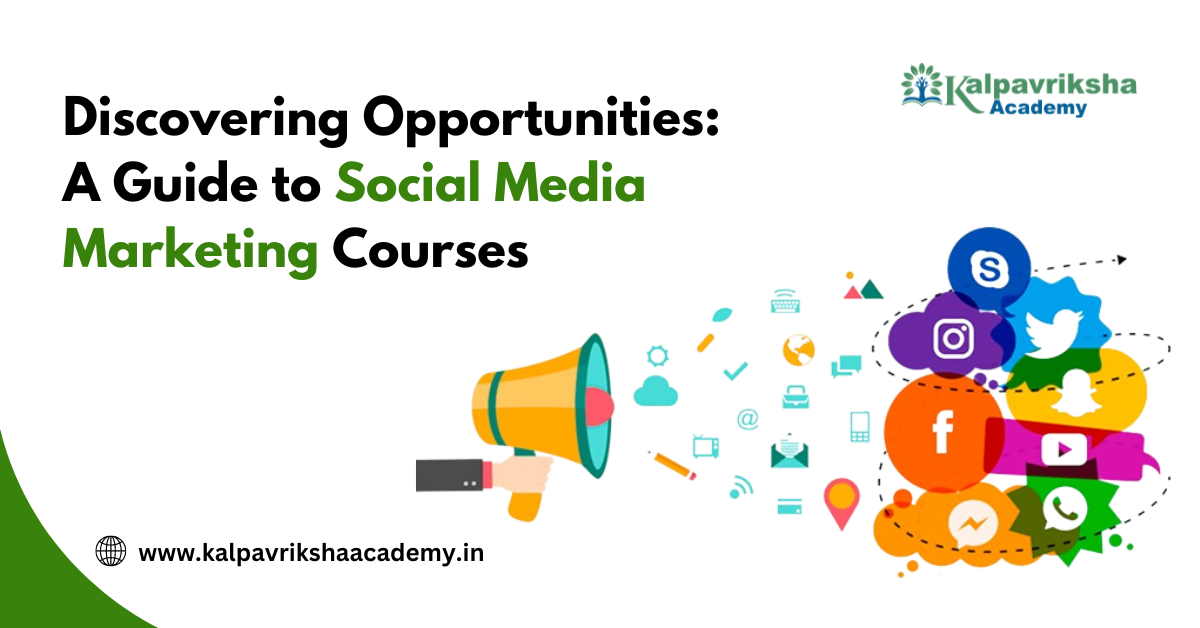A Guide to Social Media Marketing Courses
In the digital world, social media has become important for businesses to connect with their customers, build brand awareness, and increase sales. It is a dynamic field that requires creativity, adaptability, and a deep knowledge of target audience interests and algorithms. You will need up-to-date information and marketing knowledge to grow your career in digital marketing. In this article, we’ll look at social media marketing fundamentals and how online courses can help you learn marketing skills.
What is Social Media Marketing?
Social Media Marketing (SMM) allows you to use social media platforms and websites to promote your product or service. Create and share content on social media networks to achieve marketing and branding goals. Social media marketing performs various activities, such as posting text and images, videos, and other content formats that engage the audience, as well as paid advertising campaigns to connect with your target audience.
Introduction to Social Media Marketing Courses
In today’s digital world, social media has become a backbone for businesses and individuals who want to engage with their audience and promote their products and services. Social Media Marketing Courses are designed to help you enhance your knowledge and skills about social media platforms such as Facebook, Instagram, Twitter, LinkedIn, and more. These courses offer social media marketing strategies skills; after gaining these skills, you may manage social media easily with SMM strategies, whether you’re a small business individual looking to expand your online presence. Through hands-on exercises, real-world case studies, and expert guidance, you’ll learn how to develop compelling content, build and engage with your audience, and measure the effectiveness of your campaigns. You’ll explore the latest trends and methods in Social Media Marketing, empowering you to stay ahead of the ever-changing digital marketing world.
Finding Social Media Marketing Courses Near Me
Are you looking for Social Media Marketing Courses nearby? You’re in the right place! These courses are a fantastic way to learn how to harness the power of social media for your business or personal brand. Here’s how to find them:
1. Online Search:
You may search the nearby SMM courses on Google. After that, select the best coaching that fits your interests. Before taking a course from any institute, you should check the course brochure.
2. Local Colleges and Universities:
Check out the websites of colleges and universities in your area. Many institutions offer courses in digital marketing, including social media marketing. You may complete your social media course by enrolling in the course with colleges.
3. Community Colleges and Adult Education Centers:
Community colleges and adult education centers often provide affordable and accessible courses on various topics, including social media marketing. Browse their course brochure or contact them directly for more information.
4. Professional Training Institutes:
Find professional training institutes or academies that specialize in digital marketing. These organisations frequently offer comprehensive courses specifically focused on social media marketing strategies.
5. Networking Events and Workshops:
Attend networking events, workshops, and seminars related to digital marketing in your area. These events can be great opportunities to connect with industry professionals who can offer courses or recommend trustworthy training programs.
6. Social Media Groups and Forums:
Join social media groups and discussions related to digital marketing. Members often share information about local courses and training opportunities, so don’t hesitate to ask for recommendations.
How can I find Social Media Courses near me online?
To find social media courses near you online, you can follow these steps
Search on Online Learning Platforms:
Start by searching on popular online learning platforms like Kalpavriksha Academy.
Use Relevant Search Terms:
Use search terms like “social media marketing course” or “social media marketing course online.”
Filter Search Results :
Filter your search results by location if the platform allows, or look for courses offered by instructors or institutions based in your country or region.
Review Course Details:
Check the course descriptions, reviews, and ratings to ensure they meet your learning needs and preferences.
Seek Recommendations from Your Network:
Reach out to your professional network or colleagues who work in marketing. They may have suggestions or recommendations for reputable online courses.
Consider Provider Reputation and Credibility:
Consider the reputation and credibility of the course providers and instructors, as well as factors like course content, duration, and cost, before enrolling.
Review Course Requirements and Objectives :
Once you’ve identified potential courses, review any prerequisites, course materials, and learning objectives to ensure they align with your goals and skill level.
Understanding Social Media Marketing Course Outlines
Understanding the Outline of a Social Media Marketing Course is important for knowing what you’ll learn and how the course will be structured. Here’s an overview of what you can usually expect from a course outline:
1. Introduction to Social Media Marketing:
This section presents an overview of the social media marketing course, its significance in today’s digital world, and the SMM strategies you will learn throughout the course.
2. Foundations of Social Media:
In this part, you will study the fundamentals of many social media networks. Understanding their ads strategies, audience profiles, and ideal engagement strategies.
3. Content Creation and Curation:
This part focuses on creating compelling content tailored to different social media platforms, including text, images, videos, and infographics. You’ll also learn how to manage content from other sources to enhance your social media presence.
4. Audience Targeting and Engagement:
Know the strategies for identifying and targeting your target audience on Social Media. Learn how to engage with your followers effectively through likes, comments, shares, and direct messaging.
5. Social Media Advertising:
Understand the basics of social media advertising, including setting up ad campaigns, targeting specific demographics, and optimizing ad performance to achieve your marketing objectives.
6. Analytics and Measurement:
Discover how to measure the success of your social media efforts using analytics tools. Learn how to interpret key metrics such as reach, engagement, and conversion rates to refine your strategy and improve results.
7. Social Media Strategy Development:
Develop a comprehensive Social Media Strategy tailored to your business goals and target audience. Learn how to create content calendars, schedule posts, and implement campaigns effectively.
8. Community Management and Reputation Management:
Know the techniques for managing your social media community, responding to comments and inquiries, and handling negative feedback or crises effectively.
9. Emerging Trends and Technologies:
Stay up-to-date with the latest trends and technologies shaping the field of social media marketing. You will learn topics such as influencer marketing, live streaming, enhanced reality, and more.
Key Components of Social Media Marketing Course Outline
The key components of a Social Media Marketing Course are outlined in the point below:
1. Introduction to Social Media Marketing:
An overview of social media marketing, its importance in today’s digital world, and its role in business promotion and branding.
2. Understanding Social Media Platforms:
In-depth research of various social media platforms such as Facebook, Instagram, Twitter, LinkedIn, Pinterest, and Snapchat. This includes understanding their demographics, features, and best practices for content creation and engagement.
3. Content Creation and Strategy:
Strategies for creating engaging and shareable content across different social media platforms. This can involve understanding the importance of visual content, storytelling, and user-generated content.
4. Audience Targeting and Engagement:
Techniques for identifying and targeting the right audience for your business or brand on social media. This includes understanding audience demographics, behavior, preferences, and strategies for increasing engagement and building relationships with followers.
5. Social Media Advertising:
An introduction to social media advertising platforms such as Facebook Ads, Instagram Ads, and LinkedIn Ads. This includes understanding ad formats, targeting options, budgeting, and tracking performance metrics.
6. Analytics and Measurement:
Using social media analytics tools to track and measure the performance of your social media marketing efforts. This includes understanding key metrics such as reach, engagement, click-through rates, and conversion rates and using data to refine your strategy.
7. Social Media Strategy Development:
Developing a comprehensive social media marketing strategy aligned with business goals and objectives. This involves setting SMART (Specific, Measurable, Achievable, Relevant, Time-bound) goals, defining target audiences, creating content calendars, and implementing tactics to achieve desired outcomes.
8. Community Management and Customer Service:
Strategies for managing online communities and providing excellent customer service on social media platforms.
Defining the Role of a Social Media Specialist
Social Media Specialists play a vital role in increasing brand visibility, engaging with audiences, and driving business growth through strategic social media. Their expertise in content creation, platform management, audience engagement, advertising, analytics, and strategy development makes them valuable assets in today’s digital marketing landscape.
1. Content Creation and Curation:
Social Media Specialists create engaging content for various social media platforms. This includes writing compelling copy, designing visuals, and producing multimedia content such as videos and infographics.
2. Platform Management:
They manage and maintain an organization’s presence on social media platforms, including posting updates, responding to comments and messages, and monitoring trends and conversations relevant to the brand.
3. Audience Engagement and Community Building:
Social Media Specialists engage with followers and target audience, and build relationships with the online community. This involves responding to inquiries, addressing concerns, and facilitating discussions to enhance brand loyalty.
4. Social Media Advertising:
They develop and execute social media advertising campaigns to reach target audiences and achieve marketing objectives. This includes creating ad creatives, targeting specific demographics, and optimizing ad performance based on key metrics.
5. Analytics and Reporting:
Social Media Specialists analyze performance metrics and track the effectiveness of social media campaigns using analytics resources. They provide regular reports and insights to stakeholders, identifying trends, opportunities, and areas for improvement.
6. Strategy Development:
They contribute to the development of social media marketing strategies aligned with business goals and objectives. This involves conducting research, identifying target audiences, setting campaign objectives, and recommending tactics to achieve the desired outcomes.
7. Stay Updated on Trends and Best Practices:
Social Media Specialists stay aware of the latest trends, technologies, and best practices in social media marketing. They continuously seek opportunities to innovate and improve strategies to maintain a competitive edge.
8. Collaboration and Communication:
They collaborate with cross-functional teams, including marketing, sales, and product development, to align social media efforts with broader business initiatives. Effective communication skills are essential for coordinating campaigns and conveying brand messaging consistently.
7 Benefits of Pursuing Social media specialist course
Pursuing a Social Media Specialist Course offers numerous benefits, equipping individuals with the skills and knowledge needed to succeed in the dynamic field of social media marketing. Here are some key advantages:
1. Specialized Expertise:
By completing a Social Media Specialist Course, individuals gain specialized expertise in social media marketing strategies, tactics. They become proficient in content creation, audience targeting, advertising, analytics, and other essential aspects of social media management.
2. Career Opportunities:
With the rise of social media platforms as integral components of marketing strategies, there is a growing demand for skilled social media professionals. Completing a Social Media Specialist Course enhances career prospects, opening up opportunities in various industries and organizations seeking to strengthen their online presence.
3. Industry-Relevant Skills:
The course curriculum is designed to align with industry standards and best practices. Students learn practical skills and techniques applicable to real-world scenarios, enabling them to address the challenges and opportunities present in today’s digital landscape.
4. Adaptability and Versatility:
Social Media Specialist Courses cover a wide range of topics, from content creation to advertising to analytics. Graduates are equipped with a versatile skill set that allows them to adapt to evolving trends, platforms, and technologies in the ever-changing social media landscape.
5. Increased Earning Potential:
Social Media Specialists are in high demand, and their specialized skills command competitive salaries. Completing a Social Media Specialist Course can lead to higher earning potential and better career advancement opportunities.
6. Networking and Collaboration:
Social Media Specialist Courses often provide opportunities for students to network with industry professionals, mentors, and fellow classmates. Building connections within the industry can lead to collaboration opportunities, job referrals, and ongoing professional development.
7. Personal Brand Building:
Individuals pursuing a Social Media Specialist Course can apply the strategies and techniques they learn to build their personal brand online. They can showcase their expertise, share valuable content, and engage with their audience to establish themselves as thought leaders in their respective fields.
Conclusion
Social media marketing has emerged as a means for businesses and individuals to interact, engage, and promote their products, services, and ideas in today’s digital environment. We learned the value of knowing social media platforms, creating required content, engaging with audiences, and analysing the effectiveness of our efforts when researching Social Media Marketing Courses. Individuals who complete a Social Media Marketing Course might get specialised skills and expertise that are in great demand across a wide range of sectors. These courses lead to interesting job options, higher income potential, and the possibility to have an important effect on the digital marketing scene. Social Media Specialist Courses offer a comprehensive understanding of social media strategies, tactics, and tools, empowering individuals to excel in roles focused on content creation, audience targeting, advertising, analytics, and strategy development. Social Media Marketing Courses serve as invaluable resources for those looking to enhance their skills, advance their careers, or embark on entrepreneurial ventures in the dynamic realm of social media. Whether you’re a business owner, marketer, freelancer, or aspiring social media professional, the knowledge and expertise gained from these courses can boost you towards achieving your goals and making a lasting impact in the digital world.
FAQs
1. What is Social Media Marketing (SMM)?
Social Media Marketing (SMM) refers to the use of social media platforms to promote products, services, or ideas. It involves creating and sharing content on social media networks to engage with audiences and achieve marketing objectives.
2. Who can benefit from taking a Social Media Marketing Course?
Social Media Marketing Courses are beneficial for a wide range of individuals, including business owners, marketing professionals, freelancers, entrepreneurs, and anyone interested in pursuing a career in digital marketing.
3. What will you learn in a Social Media Marketing Course?
Social Media Marketing Courses cover topics such as understanding social media platforms, content creation and curation, audience targeting, social media advertising, analytics and measurement, strategy development, community management, and emerging trends in social media marketing.
4. . Will you receive a certificate upon completion of a Social Media Marketing Course?
Many Social Media Marketing Courses offer certificates of completion to participants who successfully finish the course requirements. These certificates can be valuable credentials for demonstrating proficiency in social media marketing to employers or clients.
5. How can you choose the right Social Media Marketing Course for yourself?
When selecting a Social Media Marketing Course, consider factors such as the course content, instructor expertise, accreditation, reviews and ratings, cost, and flexibility of scheduling. Choose a course that aligns with your learning goals, budget, and availability.










